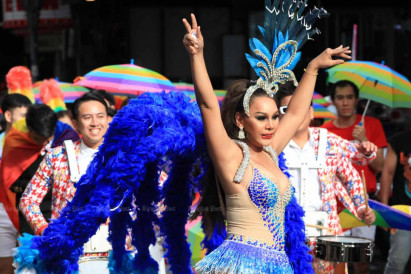LGBTQ+ campaigners take aim at ‘rainbow washing’

LGBTQ+ rights campaigners have criticised businesses for cashing in on products promoted during Pride Month while failing to support the call for equal rights.
Nikki Phinyapincha, founder of TransTalents Consulting Group, told the Bangkok Post that Pride Month, held in June, has been incorporated into companies’ marketing strategies in a move she calls “rainbow washing”.
Businesses use rainbow flags, logos and social media hashtags to promote their goods, she said, adding some have even produced special Pride Month edition goods to generate more income.
However, they are overlooking the true meaning of Pride Month, she said.
“They make us [into] merely a source of income. Pride was not originally a celebration but [a commemoration] of our struggle for not only civil rights but also socio-economic inclusion and empowerment, such as equal rights to employment, promotions and access to education,” she said. “These rights are important as they improve our living conditions.”
The business sector needs to back its support for the LGBTQ+ community with action, she said, adding each company needs to ensure a safe workplace policy for LGBTQ+ people and provide them with mental health support.
“The safe workplace for LGBTQ+ [people] is crucial, they need a place where they can express their sexuality freely,” she said. “This could help increase their productivity as they will not need to be afraid for being who they are.”
She said companies should provide LGBTQ+ people equal opportunities in climbing the corporate ladder.
Many companies still have the perception that having an LGBTQ+ leader makes their business look unprofessional and unreliable, she said.
In fact, having LGBTQ+ people in leadership roles will help companies diversify to drive systematic change in the business, she said.
“If [corporations] seek money from us, please make sure to give back by listening to what we need and what we fight for,” she said.
Nada Chaiyajit, lawyer and human rights adviser, said “rainbow washing” is also being used in politics.
Some parties launched pro-LGBTQ+ campaigns to gain votes from the community, she said.
However, there is real support from some parties, she said, including the Move Forward Party (MFP), which has drafted a marriage equality bill to amend Section 1448 of the Civil and Commercial Code, which defines marriage as a union between a man and woman.
The MFP bill aims to make the marriage law applicable to all couples, regardless of gender, she said.
In addition, the party has announced support for Thailand to host World Pride in 2028 to promote equality, she said.
However, there is also a need for change at the national level, she said. Politicians need to ensure LGBTQ+-friendly welfare policies that include paid gender affirmation leave, equal pay and civil-servant programmes that extend to partners.
She also supports the idea of having a minimum quota for LGBTQ+ and women politicians in parliament to help them advance their political careers. It would help diversify parliament because they would have a chance to voice their wants, she said.
According to the May 14 general election result, five openly LGBTQ+ MPs from the MFP were elected, but one of them, Nateepat Kulsetthasith, resigned over a drunk driving incident on May 16.
“Having a gender quota is important because we need people who truly know what we need,” Ms Nada said. “We want many political representatives from our community to vote for bills that are necessary for us LGBTQ+ people.
“Many politicians do not know what our problems are, even if they say they support us,” she noted.
The new government should consider the gender issue when assigning ministerial positions to ensure it would be gender-inclusive, she said.
“Our pride is not a one-month-long campaign, but every single second of our lives,” she said.
“We need people like us to sit in parliament to ensure our voices are heard and equally protected.”

